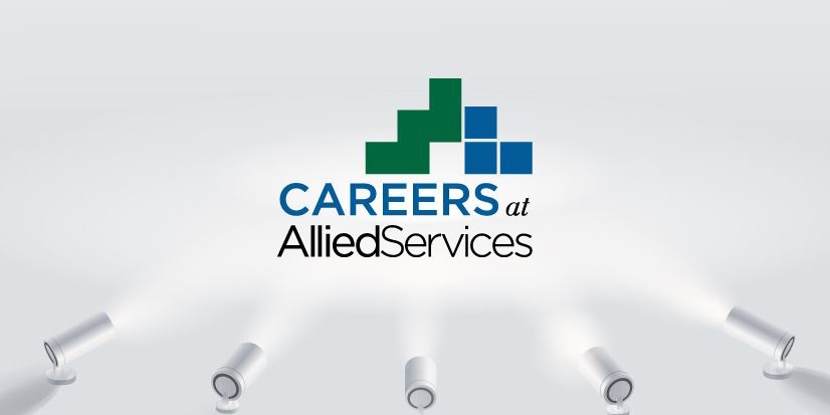Traumatic Brain Injury in Older Adults
- Category: Brain Injury
- Posted On:
- Written By: Allied Services Integrated Health

Each day in the United States, more than 500 people are hospitalized with a traumatic brain injury according to statistics released by the Centers for Disease Control and Prevention. A traumatic brain injury, or TBI, is an injury that affects how the brain works. While TBIs can be caused by motor vehicle crashes, blows to the head, or penetrating injuries such as a gunshot wound to the head, falls account for nearly half of all TBI-related hospitalizations in the United States.
Brain Injury Risks for Seniors
Elderly patients account for the largest rates of TBI-related hospitalizations and deaths. Increased fall risks in seniors including loss of muscle mass, vision problems, vestibular conditions, and side effects from medications can explain the higher incidence of TBIs, but not the higher rate of hospitalization and deaths in seniors following a TBI. To explain this, you have to look at what happens to our brains over time. As we age, our bodies and our brains shrink. This entirely natural process of brain shrinkage affects the blood vessels that connect the brain to the skull, making older adults more vulnerable to brain damage. If you are a senior taking some type of anticoagulant medication, your risk of brain bleeding after a mild TBI increases further.
Seeking Medical Care after a Fall
Traumatic brain injuries can be hard to diagnose in older adults because the symptoms may mimic or overlap with medical conditions such as dementia, which are common in older adults. Often, the patient and/or caregiver are aware of a fall but put off seeking medical attention because immediate symptoms are not present to indicate an injury or damage is occurring. Symptoms can include the classic concussion symptoms such as nausea, sensitivity to light, and headaches. However, if you notice that a loved one is suddenly struggling with bladder control, memory loss, balance, one-sided weakness, or confusion, these may also be signs that they have suffered a fall resulting in a brain injury. Seek medical help immediately to increase the chances of a full recovery.
Fuller Recovery through Intensive Rehab
Although traumatic brain injuries appear to have a greater impact on older adults, recovery, while slower, is possible. During the first three months following a brain injury, the brain's ability to change and grow is at its highest. This phenomenon is known as neuroplasticity, and the good news is that older patients can take advantage of it to improve their recovery.
Repetitive and intensive exercise (therapies) is required to engage neuroplasticity, which is why Doctors refer TBI patients of all ages to inpatient rehabilitation settings equipped to provide this specialized and intensive form of therapy and nursing care. In cases where elderly patients cannot physically tolerate such intensive rehabilitation, skilled nursing or transitional rehab are the next most appropriate care settings for a fuller recovery.
Patients work with a multidisciplinary team during an inpatient rehab stay to set and achieve realistic goals. Treatment will include rehabilitation therapies to support the patient in relearning daily activities such as eating, dressing, walking, or speaking. This may include:
- Adaptive techniques and utilization of robotic equipment and assistive devices needed for completing activities of daily living and mobility.
- Mobility skill training such as transfers, standing, and/or walking.
- Strategies to improve behavioral and social judgment problems.
- Strengthening exercises to improve muscle weakness or paralysis.
- Treatments to improve communication, swallowing, visual perception problems, memory, concentration, and problem-solving.
- Assessment of the home, which can be achieved through a variety of ways, to ensure safe mobility and set up to make the transition from rehab smooth.
Families and caregivers also become an integral part of the patient’s recovery. Oftentimes, patients will require some type of assistance at home after a TBI has occurred. Education and training for those who are living with and/or providing care to a patient after discharge will likely be included in treatment at some point during the rehab stay.
If you suspect that a loved one has suffered a head injury, don’t delay in seeking medical treatment. If a loved one has been diagnosed with a TBI, speak with your doctor about the most appropriate setting for recovery, and rest assured that those settings are equipped and ready to assist you and your loved ones along the way.
Jennifer Lutkowski PT, DPT, is Director of Rehabilitation at Allied Services Wilkes-Barre Rehab Hospital.
Comprehensive Treatment for Brain Trauma
At Allied Services Integrated Health System, we provide comprehensive care and advanced treatment and technologies to support you in your recovery following a brain injury. Our rehabilitation professionals provide personalized treatment plans to support the fullest recovery for each patient. Treatment will focus on healing the injury, restoring and relearning lost function, and improving quality of life.
- Learn more about Brain Injury Rehab
- To learn more inpatient Brain Injury Recovery in Scranton and Wilkes-Barre please call us at 570-348-1359.



